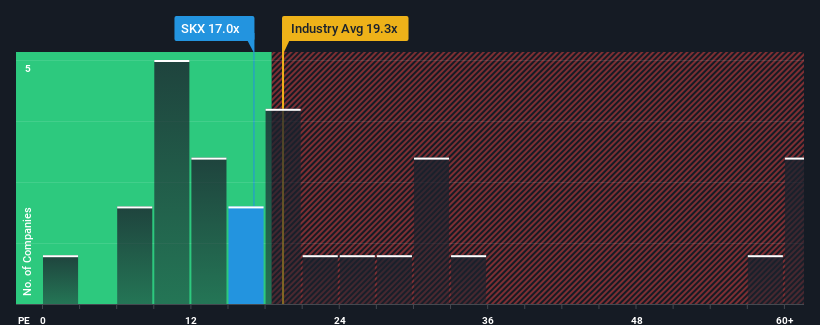
There wouldn't be many who think Skechers U.S.A., Inc.'s (NYSE:SKX) price-to-earnings (or "P/E") ratio of 17x is worth a mention when the median P/E in the United States is similar at about 17x. While this might not raise any eyebrows, if the P/E ratio is not justified investors could be missing out on a potential opportunity or ignoring looming disappointment.
With its earnings growth in positive territory compared to the declining earnings of most other companies, Skechers U.S.A has been doing quite well of late. It might be that many expect the strong earnings performance to deteriorate like the rest, which has kept the P/E from rising. If you like the company, you'd be hoping this isn't the case so that you could potentially pick up some stock while it's not quite in favour.
See our latest analysis for Skechers U.S.A

Does Growth Match The P/E?
There's an inherent assumption that a company should be matching the market for P/E ratios like Skechers U.S.A's to be considered reasonable.
Retrospectively, the last year delivered an exceptional 47% gain to the company's bottom line. The latest three year period has also seen an excellent 454% overall rise in EPS, aided by its short-term performance. Therefore, it's fair to say the earnings growth recently has been superb for the company.
Shifting to the future, estimates from the twelve analysts covering the company suggest earnings should grow by 22% per annum over the next three years. With the market only predicted to deliver 10% per annum, the company is positioned for a stronger earnings result.
In light of this, it's curious that Skechers U.S.A's P/E sits in line with the majority of other companies. It may be that most investors aren't convinced the company can achieve future growth expectations.
What We Can Learn From Skechers U.S.A's P/E?
Generally, our preference is to limit the use of the price-to-earnings ratio to establishing what the market thinks about the overall health of a company.
Our examination of Skechers U.S.A's analyst forecasts revealed that its superior earnings outlook isn't contributing to its P/E as much as we would have predicted. When we see a strong earnings outlook with faster-than-market growth, we assume potential risks are what might be placing pressure on the P/E ratio. It appears some are indeed anticipating earnings instability, because these conditions should normally provide a boost to the share price.
Don't forget that there may be other risks. For instance, we've identified 1 warning sign for Skechers U.S.A that you should be aware of.
You might be able to find a better investment than Skechers U.S.A. If you want a selection of possible candidates, check out this free list of interesting companies that trade on a low P/E (but have proven they can grow earnings).
New: Manage All Your Stock Portfolios in One Place
We've created the ultimate portfolio companion for stock investors, and it's free.
• Connect an unlimited number of Portfolios and see your total in one currency
• Be alerted to new Warning Signs or Risks via email or mobile
• Track the Fair Value of your stocks
Have feedback on this article? Concerned about the content? Get in touch with us directly. Alternatively, email editorial-team (at) simplywallst.com.
This article by Simply Wall St is general in nature. We provide commentary based on historical data and analyst forecasts only using an unbiased methodology and our articles are not intended to be financial advice. It does not constitute a recommendation to buy or sell any stock, and does not take account of your objectives, or your financial situation. We aim to bring you long-term focused analysis driven by fundamental data. Note that our analysis may not factor in the latest price-sensitive company announcements or qualitative material. Simply Wall St has no position in any stocks mentioned.
About NYSE:SKX
Skechers U.S.A
Designs, develops, markets, and distributes footwear for men, women, and children worldwide.
Undervalued with adequate balance sheet.

